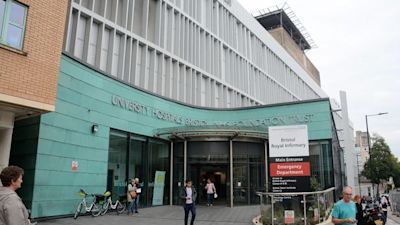Bristol hospital told to improve A&E services after inspectors find failings

Watch Royal College of Nursing South West director on CQC's BRI findings
Improvements are needed at a Bristol hospital's A&E department after inspectors found several failings.
The Care Quality Commission highlighted concerns within Bristol Royal Infirmary's emergency services following an inspection in February.
In its report, the health watchdog said it was "particularly concerned to find high levels of violence and aggression against staff from patients."
It also cited a shortage of medical staff and some lapses in Covid infection prevention measures.
Lucy Muchina, the South West's regional director for the Royal College of Nursing, told ITV News West Country the findings are worrying.
Amanda Williams, CQC’s head of hospital inspections, said: “We were particularly concerned to find high levels of violence and aggression against staff from patients in the department and to learn that staff did not feel adequately trained to deal with this.
"We have told the trust that it must take urgent action to protect both staff and patients.
"Staff need to be given the appropriate training and support to ensure they feel safe and to enable them to defuse tension and prevent violence from escalating.
“We also told the trust it must ensure it has sufficient numbers of consultants, and staff of all grades, to enable the service to run a fully operational same-day emergency service, thereby reducing demand for overnight beds.
“We have asked the trust to send us a report outlining what action they will take to meet these requirements and we will continue to monitor the service to ensure that these improvements are made.”
During the inspection, the CQC found:
The service did not have enough medical staff to meet the recommended guidance for the size of the department.
Although efforts had been made to protect patients and staff from infection during the COVID-19 pandemic, there were some lapses in infection prevention and control practices that needed addressing.
Patients did not always receive care and treatment promptly in a time considered to be safe and responsive to their needs. This was due to pressure from high demand, COVID-19 restrictions, a lack of beds in the rest of the hospital and patients being more unwell.
Patient handover from ambulance crews and waiting-time performance for onward admission to the hospital was worse than NHS national standards. However, staff were actively looking for improvements and short and long-term solutions
Although leaders and teams identified and escalated relevant risks and issues and identified actions to reduce their impact, these were not always revisited in times of crisis.
There was a perception from staff in the emergency department of limited visibility from the trust executive team and their recognition, understanding and support.
However, the report did also highlight some positives which were found during the inspection.
It said department leaders demonstrated the skills and abilities to run the service.
Staff also understood how to protect patients from abuse and acted on any concerns, while also assessing their infection and other clinical risks on arrival at A&E.
And measures were taken to ensure staff were brought in where possible to reach safe levels in instances where there was a shortage.
The CQC’s head of hospital inspections added: “During our inspection, it was clear that staff within Bristol Royal Infirmary’s accident and emergency department valued and respected each other and supported one another to deliver patient -focused care in incredibly challenging circumstances."
In response to the report, Deirdre Fowler, Interim Chief Nurse at University Hospitals Bristol and Weston NHS Foundation Trust, said: “We welcome this report from the Care Quality Commission, which highlights a number of areas of good practice.
“However, we also recognise there are areas for improvement.
“With regards to concerns about violence and aggression towards staff, we have increasedour 24-7 security presence and will be extending CCTV coverage in the emergencydepartment and we have introduced personal alarms and body-worn cameras for staff in the department.
"We will continue to take actions to support and help to protect our staff includinglaunching a package of enhanced training designed to help staff manage and de-escalatesituations where there is violent or aggressive behaviour.
Read more: